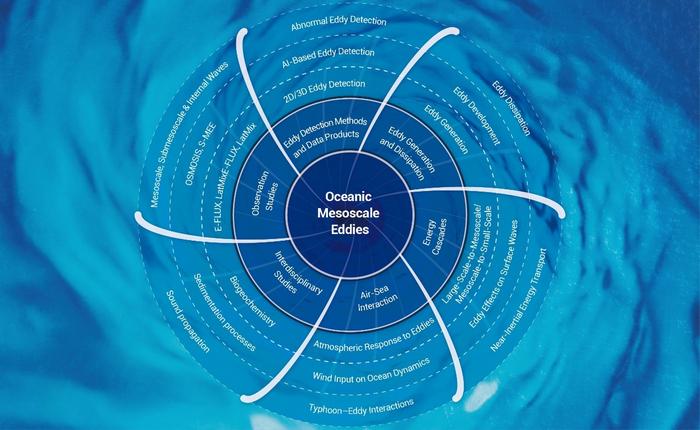Oceanic mesoscale eddies are vital to the understanding of ocean dynamic systems. These whirlwind currents stretch over tens to hundreds of kilometers and may last for weeks to months, profoundly influencing how energy is distributed within the oceans. As significant players in the oceanic framework, these eddies manage the balance of the ocean’s energy, heat redistribution, and the transport of materials, making their study crucial to grasping broader oceanographic processes. A cohort of Chinese researchers has shed new light on these fascinating entities, aiming not only to expand the community’s comprehension of their role but also to identify key research trajectories for future investigations.
Within the complex interplay of ocean dynamics, mesoscale eddies stand out as essential components. Their influence is widespread, affecting air-sea interactions, mixing processes, and the overall health of marine ecosystems. This new approach to studying these eddies comes at a time when technological advancements, such as enhanced satellite remote sensing and sophisticated in-situ observation devices, have revolutionized how scientists can monitor and assess eddies. This influx of data is now enabling researchers to build a more comprehensive picture of these phenomena than ever before.
The recent review published in the journal Ocean-Land-Atmosphere Research outlines six pivotal advancements in the area of mesoscale eddy research. The first pertains to innovations in eddy detection techniques, including the implementation of automated systems that enhance the speed and accuracy of identifying these features in vast oceanic expanses. As researchers harness machine learning and artificial intelligence, the analysis of ocean data has been accelerated, allowing for real-time insights into eddy dynamics.
Progress in understanding the basic mechanics responsible for eddy formation and dissipation constitutes the second major area of study highlighted by the researchers. This includes in-depth examinations of how eddies are born and how they dissipate as they interact with their environment. Dissecting these processes aids researchers in deciphering the life cycle of eddies, which is crucial given that their formation and decay cycles can have cascading impacts on both regional and global scales.
The third advancement revolves around breakthroughs concerning energy cascade processes. As eddies transfer energy to smaller-scale movements, they play a crucial role in ocean dynamics. Understanding this energy transfer can inform models of ocean turbulence and mixing, which are critical for predicting ocean circulation patterns and climate phenomena.
New insights into mesoscale air-sea interactions represent the fourth area of ongoing research. Recent findings illustrate that eddies do not solely respond to atmospheric conditions; instead, their presence can also significantly alter atmospheric dynamics. This mutual influence can impact weather patterns, climate models, and even marine ecosystems, emphasizing the need for interdisciplinary approaches that span oceanography and meteorology.
The fifth area identified involves interdisciplinary research that extends to biogeochemistry and acoustics. The implications of mesoscale eddies stretch far beyond physical oceanography; their effects on nutrient cycles and sound propagation in the ocean echo through various scientific fields. Highlighting these relationships drives home the point that comprehensive understanding often requires the cooperation of diverse scientific disciplines, revealing a more nuanced view of oceanic processes.
Finally, the team emphasizes the successes of specialized observation programs and collaborative efforts in data sharing and validation. These partnerships are vital for consolidating knowledge in the field and fostering a shared understanding among researchers working on related projects across different geographical regions. The pooling of resources and expertise paves the way for more impactful studies and a clearer depiction of mesoscale features in oceanic environments.
Reflecting on the current trajectory of eddy research reveals critical areas that will likely emerge as hotspots for future inquiry. Researchers foresee significant emphasis placed on the stability of mesoscale eddies and their correlations with subsequent submesoscale processes. Understanding these relationships could offer insights into how the larger systems and currents function, impacting the entire ocean environment and its ecosystems.
In particular, the ways through which mesoscale eddies contribute to broader ocean circulation systems merit further investigation. These eddies are not isolated phenomena; they interconnect with larger currents, like the Gulf Stream, and studying their impacts may yield revelations about climate conditions and ocean health.
Equally compelling is the need to understand how mesoscale processes influence air-sea exchanges and various ecological dynamics. Recent studies suggest that these currents can initiate significant shifts in carbon and nutrient cycling—critical factors in marine ecology and global climate change.
Lastly, computational models designed to simulate and predict mesoscale eddies are anticipated to evolve significantly. Leveraging advancements in computing power, researchers aspire to better understand these eddies’ behavior in diverse environmental settings, ultimately aiding forecasting efforts essential to marine resource management and climate resilience strategies.
In sum, the advancements highlighted in this research representation provide exciting benchmarks that underscore the significance of mesoscale eddies in oceanographic discourse. Recognizing their pivotal role will not only refine academic perspectives but also guide policy efforts aimed at mitigating climate change and preserving marine ecosystems. The intersection of technology and marine science presents a frontier of possibilities—an era where understanding the ocean becomes increasingly paramount to addressing the planet’s climate challenges.
Subject of Research: Oceanic mesoscale eddies’ effects and their role in ocean dynamics.
Article Title: Advances in Mesoscale Eddy Research: Future Directions and Insights
News Publication Date: 12-Feb-2025
Web References: 10.34133/olar.0081
References:
Image Credits: Changming Dong, Nanjing University of Information Science & Technology, Nanjing, China, 2025
Keywords: ocean dynamics, mesoscale eddies, energy distribution, air-sea interactions, interdisciplinary research, climate change, oceanic processes.




